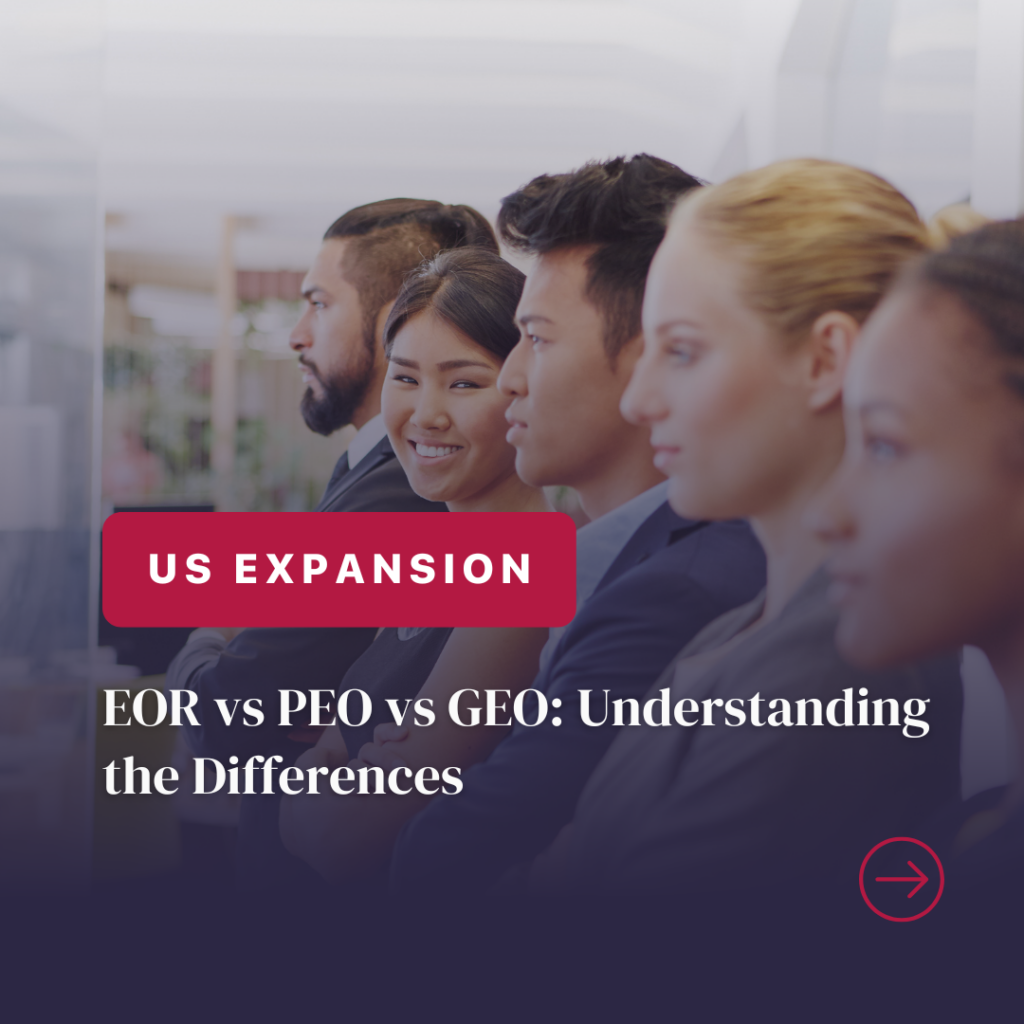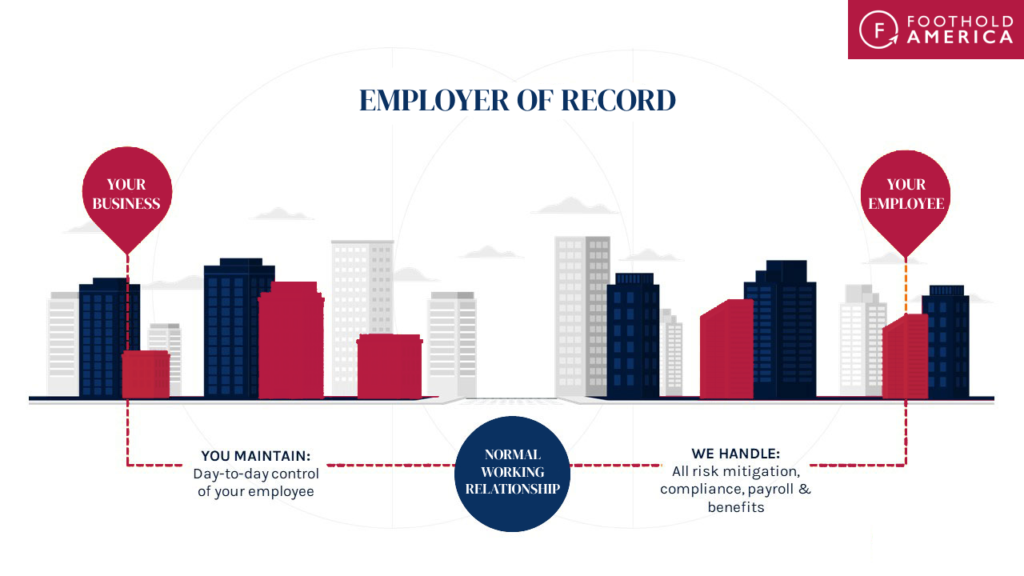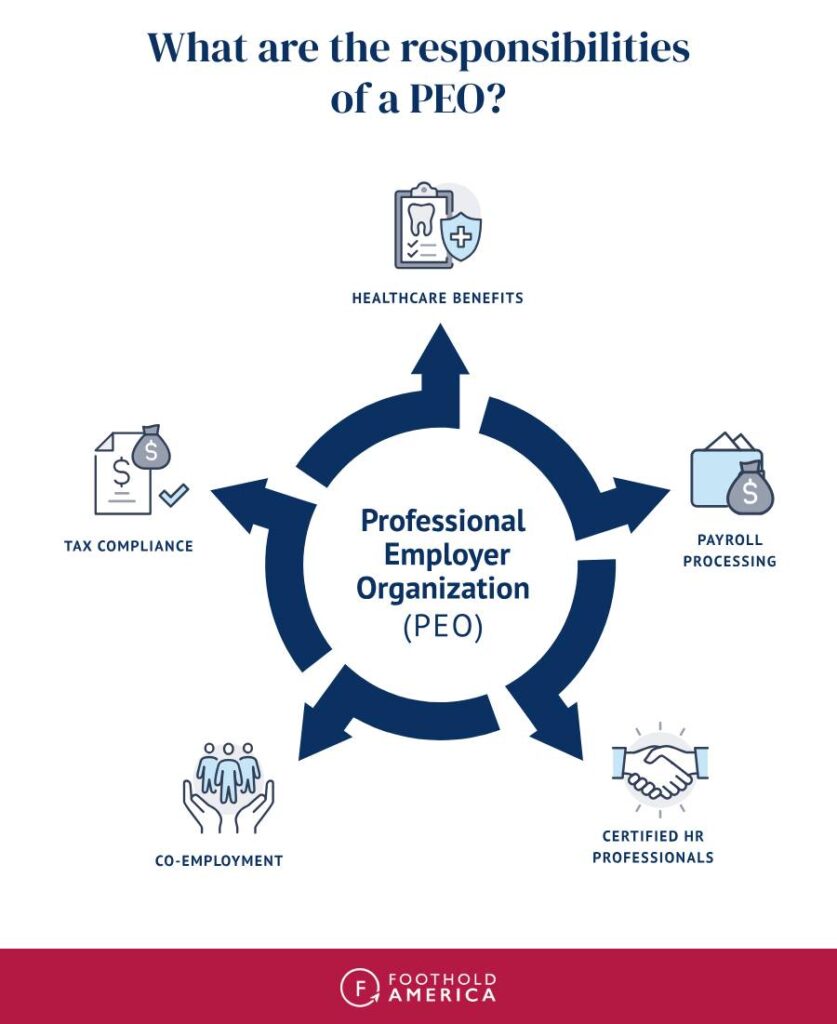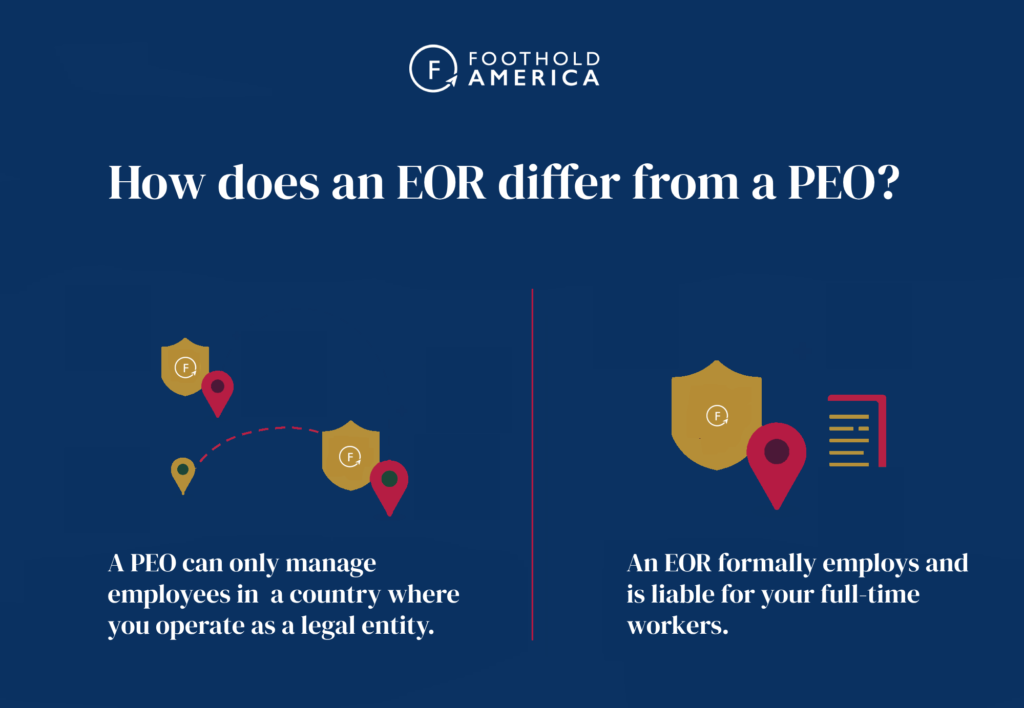EOR vs PEO vs GEO: Understanding the Differences
Companies increasingly look beyond their borders for growth opportunities, talent acquisition, and market expansion in today’s globalized business environment. However, navigating the complexities of international employment presents significant challenges, from compliance with local labor laws to managing payroll across different jurisdictions. Three solutions have emerged to address these challenges: Employer of Record (EOR), Professional Employer Organization (PEO), and Global Employment Organization (GEO).
While these terms are sometimes used interchangeably, they represent distinct approaches to employment and HR management, each with unique features, advantages, and limitations. Understanding the differences between EOR, PEO, and GEO is crucial for making informed decisions about your global expansion strategy.
Your chosen model can significantly impact your international operations, affecting everything from compliance and risk management to costs and operational flexibility. Whether hiring your first international employee or expanding into multiple countries simultaneously, selecting the right employment solution can mean the difference between a smooth, successful expansion and a costly, complicated endeavor.
This comprehensive guide will thoroughly explore these models, examining their key differences, advantages, limitations, and ideal use cases. By the end, you’ll clearly understand which solution best aligns with your specific business needs and expansion goals.
What is an Employer of Record (EOR)?
An Employer of Record (EOR) is a third-party organization that takes on the legal responsibility of employing workers on behalf of another company. When you partner with an EOR, they become your workforce’s official, legal employer in a foreign country while you maintain day-to-day operational control over your employees.
“An EOR provides international businesses with a turnkey solution for hiring globally, eliminating the need to navigate complex entity setup, local registrations, and employment compliance challenges independently. We handle everything from onboarding to offboarding, allowing you to focus on growing your business.” — Angelique Soulet-Bangurah, PHR, Head of EOR Services & Talent Acquisition Lead at Foothold America.
The primary function of an EOR is to enable companies to hire employees internationally without establishing a legal entity in each country. The EOR handles all aspects of legal employment, including:
- Creating compliant offer letters and employment agreements
- Processing payroll and ensuring appropriate tax withholdings
- Managing employee benefits administration
- Ensuring compliance with local labor laws and regulations
- Handling immigration requirements and work permits
- Providing HR support and guidance
This arrangement creates a separation between employment and operations: the EOR handles all employment-related legal responsibilities, while your company maintains control over the employees’ day-to-day activities, responsibilities, and performance management.
EORs are particularly valuable for companies in several scenarios:
- When testing new international markets before establishing a permanent presence
- When hiring in countries where you don’t have a legal entity
- When you need to hire quickly without waiting for entity establishment
- When compliance with complex local employment laws is a concern
- When you need flexibility to enter or exit markets with minimal risk
By partnering with an EOR, companies can accelerate their business expansion, reduce compliance risks, and focus on their core business activities rather than administrative and legal complexities.
Read more: How to Choose the Best EOR
What is a Professional Employer Organization (PEO)?
A Professional Employer Organization (PEO) is a company that provides comprehensive HR solutions through a co-employment arrangement. In this model, the PEO shares employer responsibilities with the client company, creating a partnership where both entities have specific roles in managing the workforce.
“A PEO relationship allows businesses with established entities to focus on their core operations while we handle HR administration, compliance, and benefits management complexities. Our PEO+ Cross-Border Support™ goes beyond traditional PEO services to address international companies’ unique challenges when operating in the US market.” — Robert R. Esquijarosa, Head of Service Implementation at Foothold America.
Unlike an EOR, a PEO operates on a co-employment model, where the PEO and the client company share employer responsibilities. The client company maintains its legal entity and retains primary control over its workforce, while the PEO handles various HR functions and administrative tasks.
Key services provided by PEOs include:
- Payroll processing and tax administration
- Benefits management and administration
- HR compliance and risk management
- Workers’ compensation insurance
- Recruitment and onboarding support
- Employee relations assistance
It’s important to note that to work with a PEO, your company must have a legal entity established in the country where the PEO operates. This is a fundamental requirement that distinguishes PEOs from EORs.
PEOs are typically most beneficial in these scenarios:
- When you have an established legal entity but want to outsource HR functions
- When you seek economies of scale for benefits and HR services
- When you need expertise in local employment regulations and compliance
- When you want to offer competitive benefits packages to attract talent
- When administrative HR tasks divert resources from core business activities
In the United States, PEOs have become a popular solution for companies seeking to optimize their HR operations while maintaining control over their workforce. A PEO can provide valuable support for international companies with established US entities in navigating the complex landscape of US employment regulations and benefits management.
Read more: 5 Ways PEO Streamlines your HR Processes
What is a Global Employment Organization (GEO)?
A Global Employment Organization (GEO) is a specialized service provider that enables companies to hire employees internationally through a network of established entities across multiple countries. GEOs provide a comprehensive solution for global employment, handling all aspects of hiring, payroll, benefits, and compliance across international borders.
“While Foothold America specializes exclusively in US employment solutions through our EOR and PEO+ services, we understand that many businesses evaluate different global expansion models. GEOs can be valuable for companies needing simultaneous multi-country expansion, but we’ve found that specialized country expertise often delivers superior results for businesses with specific target markets like the United States.” — Joanne Farquharson, President and CEO of Foothold America.
The term “GEO” is sometimes used interchangeably with “EOR,” which can create confusion. However, there are subtle but important distinctions between the two concepts. While an EOR typically refers to a service that employs workers on your behalf in a specific country, a GEO generally refers to a global network of EOR services spanning multiple countries under a single provider.
A GEO typically offers these key services:
- Legal employment through established entities in multiple countries
- Global payroll management across different currencies and tax systems
- Benefits administration that meets local requirements and expectations
- Compliance with all applicable labor laws and regulations
- Immigration support for cross-border employment
- Global HR support and consulting
- Consolidated reporting and management across all international employees
The primary advantage of a GEO is its ability to provide a unified solution for international employment across multiple countries. It offers a single point of contact and consistent service regardless of where employees are located.
GEOs are particularly valuable in these scenarios:
- When you’re expanding into multiple countries simultaneously
- When you need a standardized approach to international employment
- When you seek consolidated management of a global workforce
- When you need flexibility to enter and exit various markets quickly
- When you want to minimize the administrative complexity of managing employees across borders
By partnering with a GEO, companies can streamline their global expansion, maintain consistent employment practices across countries, and reduce the administrative burden of managing international compliance and payroll requirements.
Key Differences Between EOR, PEO, and GEO
Understanding the fundamental differences between an Employer of Record, a Professional Employer Organization, and a Global Employment Organization is essential for making the right choice for your business. Here’s a detailed comparison of the key distinctions:
Feature | EOR | PEO | GEO |
Legal Employer | Yes | No (Co-Employer) | Yes |
Entity Required? | No | Yes | No |
Payroll & Compliance | Fully Managed | Shared Responsibility | Fully Managed |
Best For | Companies hiring employees and testing the market | Companies seeking enhanced HR capabilities with your in-country entity. | Companies hiring across multiple countries |
Legal Employment Relationship
EOR: Acts as the full legal employer of your workforce. The EOR assumes most employer liabilities and responsibilities, with your company maintaining operational control over day-to-day activities.
PEO: Establishes a co-employment relationship where the PEO and your company share employer responsibilities. Your business remains the primary employer, while the PEO handles specific HR and administrative functions.
GEO: Similar to an EOR, a GEO becomes the legal employer of your international workforce, assuming most employer liabilities and responsibilities while you maintain operational control.
Entity Requirements
EOR: No need for your company to establish a legal entity or bank account in a foreign country. The EOR leverages its existing legal infrastructure to employ workers on your behalf.
PEO: Requires your company to have an established legal entity and bank account in the country where the PEO operates. This is a fundamental prerequisite for the co-employment relationship.
GEO: Like an EOR, a GEO does not require you to establish your own legal entity in the countries where you hire employees. The GEO uses its network of established entities to employ workers on your behalf.
Geographic Focus
EOR: Typically focused on enabling employment in specific countries or regions. Companies may need to engage multiple EORs to cover different international markets.
PEO: Primarily focused on domestic employment in a single country, particularly in the United States. Traditional PEOs typically don’t support international employment.
GEO: Specifically designed for multi-country employment, offering a comprehensive solution for global workforce management across numerous international markets.
Compliance Management
EOR: Takes responsibility for ensuring compliance with local employment laws and regulations in the specific country where they operate.
PEO: Shares compliance responsibilities with your company through the co-employment arrangement, with specific duties outlined in the service agreement.
GEO: Manages compliance across multiple countries, coordinating various legal requirements and ensuring adherence to applicable regulations in each jurisdiction.
Service Focus
EOR: Focused on enabling legal employment in countries where you don’t have an entity, with an emphasis on compliance and risk management.
PEO: Centered on optimizing HR functions and providing access to competitive benefits through economies of scale, primarily for companies with established entities.
GEO: Specialized in providing a unified solution for international employment across multiple countries, with standardized processes and consolidated management.
Understanding these differences is crucial for selecting the right model for your business needs. While there is some overlap in services, each option is designed to address distinct challenges and scenarios in global employment.
Read more: EOR vs PEO
Pros & Cons of EOR vs PEO vs GEO
Each employment model offers unique advantages and limitations. Understanding these pros and cons is essential for determining which solution best aligns with your business needs and objectives.
Employer of Record (EOR) Pros and Cons
Pros of Using an EOR
✅ No need for a local entity: Eliminates the need to establish a legal entity in the foreign country, saving time and resources. You can start hiring immediately without the lengthy and costly process of entity formation, local registrations, and banking setup.
✅ Full compliance and payroll management: The EOR ensures complete compliance with all applicable employment laws and regulations. It stays current with constantly changing local regulations, protecting your business from potential penalties and litigation.
✅ Quick market entry: Enables rapid expansion into new markets without the delays associated with entity establishment. You can hire employees in as little as a few days to a couple of weeks rather than the months required for entity formation.
✅ Reduced risk: The EOR minimizes employment-related risks and liabilities for your company. It assumes responsibility for employment claims, workers’ compensation issues, and other potential legal challenges.
✅ Flexibility: This allows businesses to easily enter or exit markets based on their needs. This flexibility is particularly valuable for testing new markets or project-based operations with defined timeframes.
Cons of Using an EOR
❌ Higher cost than a PEO: Generally more expensive than PEO services due to the comprehensive nature of the employment relationship. The added convenience and risk reduction come at a premium compared to other HR solutions.
❌ Limited control over certain HR policies: As the legal employer, the EOR has final authority on some employment matters, which may not always align perfectly with your preferences.
Professional Employer Organization (PEO) Pros and Cons
Pros of Using a PEO
✅ Cost-effective HR solution: Often more economical for businesses with an established presence, particularly for larger workforces. PEOs leverage economies of scale to provide HR services at lower rates than maintaining an in-house department.
✅ Access to shared benefits plans: Through economies of scale, PEOs can provide access to comprehensive benefits packages at competitive rates. By pooling employees from multiple companies, they can negotiate better terms with insurance providers and other benefits vendors.
✅ Greater control over employment policies: Maintains more control over HR policies and employment decisions. As the primary employer, you preserve authority over most aspects of the employment relationship while receiving support from the PEO.
✅ HR expertise and support: Offers access to HR specialists and resources. PEOs employ experts in various HR disciplines, giving you the benefit of specialized knowledge without the cost of hiring these professionals directly.
✅ Scalable for growing businesses: PEOs provide scalable HR solutions that grow with your business. They can easily accommodate workforce expansions or reductions, providing consistent support as your needs evolve.
Cons of Using a PEO
❌ Requires a legal entity in the country and bank account: Your company must have an established legal entity in the country where the PEO operates. This prerequisite means you must complete the entity formation process before engaging a PEO, which can be time-consuming and costly.
❌ Shared employer liabilities: Maintains some employer liabilities and responsibilities. The co-employment relationship means your company still bears certain legal risks and obligations related to employment.
Global Employment Organization (GEO) Pros and Cons
Pros of Using a GEO
✅ Ideal for global expansion: A GEO provides a comprehensive solution for hiring employees across numerous countries simultaneously. It offers a single point of contact and consistent processes regardless of where your employees are located, making it most valuable for companies expanding into many international markets at once.
✅ Handles complex international payroll: Manages the complexities of global payroll, including different currencies, tax systems, and payment methods. This centralized approach simplifies what would otherwise be a highly complex administrative task.
✅ Standardized processes across countries: Offers consistent employment practices and reporting across international operations. This standardization simplifies management and ensures a uniform approach to global employment.
Cons of Using a GEO
❌ More expensive than a PEO: International services generally command premium pricing due to their comprehensive nature. A single global solution’s convenience comes with higher costs than country-specific alternatives.
❌ Potential lack of depth in country-specific expertise: May not offer the same depth of local knowledge as country-specific EORs. The broad coverage sometimes comes at the expense of detailed expertise in the nuances of individual markets.
❌ Limited flexibility for country-specific customization: Processes are often standardized across countries, which may limit adaptation to unique local practices or requirements. This one-size-fits-all approach might not always accommodate specific regional needs.
❌ Dependency on a single provider: Creates reliance on one provider for all international employment, potentially creating vulnerability if service quality issues arise. This concentration of services can present risks if the relationship deteriorates.
When to Choose EOR vs PEO vs GEO
The decision between an Employer of Record, a Professional Employer Organization, and a Global Employment Organization should be based on your business circumstances, expansion goals, and operational requirements. Here’s a framework to help you determine which solution is right for your business.
Use an EOR if:
- You need global hiring without setting up an entity: If your company hasn’t established a legal entity in the country where you want to hire, an EOR provides a turnkey solution for compliantly employing workers.
- You’re testing new markets: When exploring a new market before making a significant investment, an EOR offers flexibility without committing to permanent infrastructure.
- You need rapid market entry: If speed is essential for your expansion strategy, an EOR eliminates the lengthy process of entity establishment, allowing you to hire employees quickly.
- You value compliance certainty: When navigating unfamiliar employment laws is a concern, an EOR assumes full responsibility for compliance management, reducing your risk.
- You require flexibility to scale up or exit: If your international operations need to scale quickly or potentially exit a market, an EOR provides the agility to adapt without complex legal procedures.
“An EOR is ideal for companies that want to move quickly in the US market without the delays of entity setup. Many clients start with our EOR service as they test the market, then transition to other models as their US presence grows. The beauty of an EOR is that it gives you immediate compliance with all federal and state employment laws while you focus on building your business.” — Angelique Soulet-Bangurah, PHR, Head of EOR Services & Talent Acquisition Lead at Foothold America.
Use a PEO if:
- You have a US entity and need HR & benefits support: If your company already has a legal entity in the United States, a PEO can enhance your HR capabilities without changing your corporate structure.
- You seek cost-effective HR services: A PEO often provides more cost-effective HR services through economies of scale for businesses with an established presence and larger workforces.
- You want competitive benefits packages: If offering comprehensive employee benefits is a priority, a PEO can provide access to high-quality benefits packages at competitive rates.
- You prefer greater control over HR policies: When maintaining control over employment policies and decisions is essential, a PEO’s co-employment model offers more autonomy.
- You need specialized HR expertise: If access to HR specialists and resources is a priority, a PEO offers comprehensive HR support and guidance without the cost of building an internal department.
“Our PEO+ Cross-Border Support™ is specifically designed for international companies that have established their US entity but still need specialized support navigating the complexities of American employment practices. We’ve found that companies with 5+ employees in the US particularly benefit from this model, as it combines compliance expertise with greater control over your workforce and operations.” — Robert R. Esquijarosa, Head of Service Implementation at Foothold America.
USE a GEO If:
While Foothold America specializes exclusively in US employment solutions, clients exploring multiple expansion options often ask about GEO services. GEOs are typically third-party providers that offer employment solutions across multiple countries through a single contract.
“At Foothold America, we specialize deeply in US employment rather than offering GEO services across multiple countries. Our clients benefit from our focused expertise in the complex US market. For companies whose primary target is the United States, working with a US specialist like Foothold America typically provides more tailored support and deeper compliance expertise than a global provider whose knowledge is spread across dozens of countries.” — Joanne Farquharson, President, and CEO of Foothold America
If your expansion strategy requires hiring employees in multiple countries simultaneously, you may need to evaluate GEO providers. However, even companies working with global providers often partner with Foothold America specifically for their US operations, leveraging our specialized expertise in this crucial market.
The right choice ultimately depends on your specific expansion goals, timeline, budget, risk tolerance, and operational preferences. Companies evolve their approach over time, starting with an EOR for initial market entry and later transitioning to a PEO as their presence in a particular country matures.
Cost Comparison: EOR vs PEO vs GEO
Understanding the cost structures of Employer of Record, Professional Employer Organization, and Global Employment Organization services is essential for making a financially sound decision for your business. Here’s a detailed comparison of the typical pricing models.
EOR Pricing
Employer of Record services typically follow these pricing structures:
Fixed fee per employee: Many EORs charge a set monthly fee for each employee that scales based on the employee’s salary level. This structured approach ensures that pricing aligns with the value and complexity of employing higher-compensated professionals while still providing predictable costs for budgeting purposes.
Additional considerations:
- Setup fees may apply for initial implementation
- Additional services beyond standard offerings may incur extra charges
- Volume discounts might be available for larger workforces
Foothold America offers transparent pricing for our EOR services. This straightforward approach eliminates surprise costs and provides predictability for international businesses planning their US expansion.
PEO Pricing
Professional Employer Organization services commonly use these pricing approaches:
Percentage of payroll costs: Most PEOs charge a per-employee-per-month (PEPM) fee, some charge a percentage of the total payroll, typically ranging between 2-12% of wages, as noted in industry standards. The exact percentage depends on the size of your workforce, the complexity of your requirements, and the specific services included.
Administrative fees: Some PEOs charge administrative fees in addition to the percentage of payroll, which cover specific services or administrative tasks.
Service tiers: Many PEOs offer different service packages at varying price points based on the comprehensiveness of the services provided.
It’s important to note that businesses with 20-75 employees are typically the sweet spot for full-service PEOs, unlocking their full potential to handle all HR needs. However, Foothold America’s PEO+ Cross-Border Support™ is designed to be accessible for companies with as few as one employees, making it an ideal solution for international businesses in the early stages of US expansion.
GEO Pricing
Global Employment Organization services generally follow these pricing structures:
Variable based on country & workforce size: GEO pricing often varies significantly based on the countries where you’re hiring and the number of employees in each location. Countries with more complex employment regulations or higher operating costs typically command premium pricing.
Consolidated service fee: Many GEOs offer a comprehensive fee that covers all aspects of employment across multiple countries, potentially with volume discounts for larger global workforces.
Tiered global packages: Some GEOs provide tiered service packages with different levels of support and features, allowing companies to select the option that best aligns with their needs and budget.
Additional considerations:
- Global coverage extent may affect pricing
- Service level agreements may impact the cost
- Technology platforms and reporting capabilities may influence fees
- Implementation and onboarding costs may apply
Which is More Cost-Effective for Your Business?
The relative cost-effectiveness of EOR, PEO, and GEO services depends on your specific circumstances.
EOR services tend to be more cost-effective when
- You have a small international workforce
- You don’t have a legal entity in the target country
- You need rapid deployment
- You value simplified administration and risk management
PEO services tend to be more cost-effective when:
- You have an established entity in the country
- You have a larger workforce
- You’re seeking comprehensive HR support
- You value long-term HR partnership
GEO services tend to be more cost-effective when:
- You’re hiring across multiple countries simultaneously
- You need consistent processes across borders
- You value consolidated global management
- Administrative simplification is a priority
The total cost consideration should include both direct fees and indirect benefits, such as time savings, risk reduction, access to expertise, and operational efficiency. A holistic evaluation of these factors will help you determine which solution offers the best overall value for your specific business needs and expansion goals.
Choosing the Right Provider & What to Look For
Selecting the right provider for your global employment needs is a critical decision that can significantly impact the success of your international expansion. Whether you’re considering an EOR, PEO, or GEO, several key factors should inform your choice.
Specialized Expertise vs. Global Coverage
Many companies mistakenly prioritize global coverage over specialized expertise when selecting a provider. While global providers offer services across multiple countries, they often lack the depth of knowledge needed to navigate complex markets like the United States effectively. It’s also okay to mix and match. You might use a PEO through your entity in a priority country like the US and a GEO or EOR in other countries where you have only one employee and no entity.
A provider’s reputation and track record offer valuable insights into their reliability and service quality. Rather than seek providers with the broadest geographical reach, focus on those with established experience and proven success in your target markets. Client testimonials from companies similar to yours provide meaningful evidence of a provider’s capabilities.
Foothold America has established its reputation as the premier EOR and PEO+ provider for US expansion. Our exclusive focus on the United States allows us to develop more profound expertise than global providers who spread their attention across dozens of countries. If the United States is your target for expansion, choosing a specialized US provider like Foothold America ensures you receive the precise, detailed guidance needed to navigate America’s complex employment landscape rather than the generalized support offered by global providers.
Compliance Expertise
The core value of any employment service is ensuring compliance with applicable laws and regulations. Evaluate potential providers based on their compliance expertise, including:
- Depth of knowledge in relevant employment laws
- Track record of compliance management
- Proactive monitoring of regulatory changes
- Transparency about compliance processes
- Resources dedicated to staying current with evolving requirements
This expertise is particularly important in complex markets like the United States, where employment regulations vary at federal, state, and local levels and can change frequently. A provider with deep compliance expertise can help you navigate these complexities and avoid costly mistakes.
Foothold America’s specialized focus on the US market provides unmatched compliance expertise for companies expanding into the United States. Our team stays current with changes in employment laws and regulations at all levels, ensuring that your US workforce remains fully compliant with all applicable requirements.
Payroll & HR Support Services
The quality and accessibility of payroll and HR support services can significantly impact your experience with a provider. Consider factors such as:
- Support availability across relevant time zones
- Response times for inquiries
- Expertise of support staff
- Availability of dedicated account management
- Depth of resources for complex situations
Technology platforms also play an important role in service delivery, providing access to employment data, payroll information, and HR resources. Evaluate the provider’s technology offering based on user-friendliness, functionality, security, and integration capabilities.
Foothold America provides comprehensive HR and payroll support services, with dedicated account managers who understand US employment requirements and the unique needs of international companies. Our support team is available during business hours in multiple time zones, ensuring responsive assistance for your global team.
Contract Flexibility
The terms and flexibility of your service agreement are essential considerations, particularly for companies with evolving needs. Key aspects to evaluate include:
- Contract duration and commitment requirements
- Scalability provisions for workforce changes
- Geographic coverage and expansion options
- Termination conditions and transition support
- Adaptability to changing business requirements
Look for providers that offer flexible terms aligned with your business objectives. These terms allow you to adjust services as your needs evolve rather than locking you into rigid arrangements that may not accommodate growth or strategic changes.
Conclusion & Final Recommendation
Choosing between an Employer of Record (EOR), Professional Employer Organization (PEO), and Global Employment Organization (GEO) is a strategic decision that significantly impacts your expansion journey. Understanding the key differences helps you select the best option that fits your needs.
An EOR provides the fastest path to hiring employees in countries where you don’t have a legal entity, making it ideal for market testing and rapid expansion with minimal upfront investment. A PEO offers comprehensive HR support for companies with established legal entities, particularly in the United States, providing cost-effective services while allowing greater control over employment policies. While GEOs deliver unified solutions for companies expanding into multiple countries simultaneously, they generally come at a premium price point.
Your choice should consider factors such as your current legal structure, timeline requirements, desired level of control, budget constraints, and long-term vision for your operations.
For companies explicitly targeting the United States market, Foothold America offers specialized expertise as an EOR provider and through our innovative PEO+ Cross-Border Support™ solution. While we don’t provide GEO services, our exclusive focus on the US market offers unparalleled depth of knowledge in US employment laws and compliance requirements, ensuring a smooth expansion experience for companies entering the world’s largest economy.
Ready to take the next step in your US expansion journey? Contact the experts at Foothold America today for personalized guidance on selecting the right employment solution for your specific needs
Frequently Asked Questions: EOR vs PEO vs GEO
Get answers to all your questions and take the first step towards a US business expansion.
An Employer of Record (EOR) is a third-party organization that becomes the official employer of your workforce in different countries while you maintain operational control. EORs handle all aspects of compliance with local laws, process payroll taxes, and manage hr processes, enabling companies to hire global talent without establishing their own entity in each new country. This eor solution is ideal for testing markets, hiring quickly, and addressing compliance issues.
With an EOR, they take full responsibility for tax compliance, handling all tax regulations and payroll taxes according to local tax laws in different countries. When establishing your own entity, your company directly manages these legal issues, requiring significant resources to understand and comply with varying tax laws across jurisdictions. An EOR simplifies this process for companies focusing on international hiring.
The key differences are in legal structure and requirements: An EOR acts as the full legal employer without requiring you to have a local presence. A PEO creates a co-employment relationship but requires your own entity in the country. A GEO provides multi-country employment solutions for companies expanding into different countries simultaneously. Each offers different approaches to employee management and administrative responsibilities based on your expansion plans.
EOR solutions handle most legal issues when hiring in a new country by taking responsibility for compliance with local laws, managing tax regulations, creating compliant employment agreements, handling immigration requirements, and ensuring proper payroll taxes. As the official employer, the EOR shields your company from compliance issues while you focus on integrating the new hire into your operations.
When you have established your own entity in a country, a PEO offers cost-effective HR processes, access to better benefits plans through economies of scale, greater control over employment policies, HR expertise without hiring specialists directly, and scalable solutions for growing businesses. PEOs help optimize your hiring process while maintaining your legal presence in the country.
Remote work has made EORs increasingly valuable because they allow companies to hire top talent internationally without geographic limitations or establishing entities in every location. EORs handle varying compliance with local laws for remote workers in different countries, offering flexibility to scale teams up or down. This approach is typically more cost-effective than maintaining your own entity for small remote teams while ensuring proper tax compliance.
An EOR manages the entire hiring process including creating compliant offer letters, handling work permits, setting up payroll taxes, enrolling the new hire in benefits programs, ensuring registration with local authorities, and implementing appropriate HR processes. By managing these administrative responsibilities, an EOR ensures compliance with local laws while allowing you to focus on your core business.
When using an EOR, intellectual property considerations require attention in employment agreements. Though the EOR is the legal employer, properly drafted agreements ensure IP rights transfer to your company. EORs navigate the varying local laws regarding intellectual property ownership in different countries while maintaining confidentiality. It’s advisable to work with legal advice to ensure proper protection in all jurisdictions.
When planning international expansion, companies should consider: market testing needs, timeline for hiring, workforce size, complexity of local laws in the new country, budget constraints, risk tolerance, internal HR capabilities, and exit strategy. These factors help determine whether an EOR, PEO, GEO, or establishing your own entity is most appropriate for accessing global talent while managing legal issues.
Payroll taxes and local tax laws are critical in choosing between solutions: An EOR takes full responsibility for all tax compliance in foreign jurisdictions. A PEO shares tax responsibilities but requires your own entity registered with tax authorities. A GEO manages taxes across multiple countries. For companies expanding internationally, EOR or GEO solutions eliminate the need to develop expertise in tax regulations across different countries, reducing administrative responsibilities while ensuring compliance.
GET IN TOUCH
Contact Us
Complete the form below, and one of our US expansion experts will get back to you shortly to book a meeting with you. During the call, we will discuss your business requirements, walk you through our services in more detail and answer any questions you might have.






